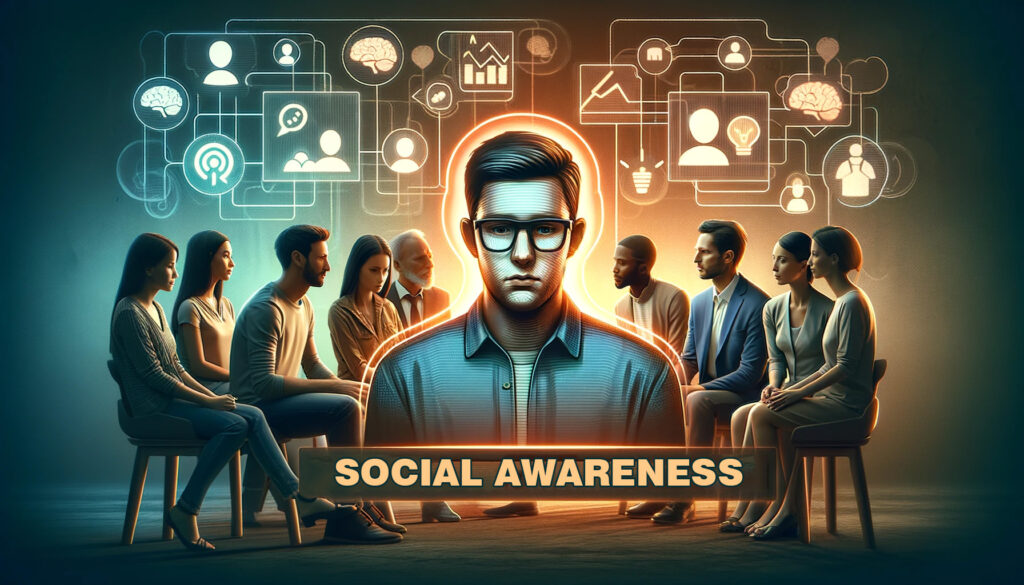Emotional Intelligence (EQ) is a pivotal factor in nurturing and enhancing interpersonal relationships. It represents the ability to comprehend, utilize, and manage one’s own emotions positively, facilitating effective communication, empathy, and conflict resolution. This skill set is vital not only for personal development but also for building strong, harmonious relationships in both personal and professional settings.
At the heart of EQ are four core components: self-awareness, self-regulation, social awareness, and relationship management.
Understanding the Four Core Components of EQ
Let’s talk about the four parts of Emotional Intelligence, or EQ, like the roots of a strong tree that help it stand tall.
Self-Management:
Think of this like steering your canoe in a calm way, even when the river gets rough. It means not letting your quick feelings take control. You learn to keep your emotions like the quiet waters and change direction smoothly when things around you change.
Self-Awareness:
This is like looking into the clear water and seeing your reflection. It’s knowing what you feel inside and understanding why. This helps you make good choices, like knowing when to paddle hard and when to let the river take you.
Social Awareness:
Imagine walking in someone else’s moccasins, feeling what they feel. It’s seeing the signs in how people act and talk, and caring about their feelings. It’s like sitting around a fire and understanding everyone’s stories.
Relationship Management:
This is building and keeping strong bonds with others. It’s talking clearly, sorting out disagreements in a good way, and leading others with a kind heart. Like a circle of friends holding hands, it’s about staying connected and respectful.
Growing these parts of EQ is like growing a healthy garden. It helps you and your relationships bloom, like flowers in spring. It’s about knowing yourself, guiding your canoe wisely, understanding others, and keeping your circle strong.
The Role of EQ in Personal and Professional Life
Emotional Intelligence (EQ) plays a pivotal role in both our personal and professional lives, acting like a compass guiding us through the complexities of human interactions. When EQ is high, it often leads to better job performance, healthier team dynamics, and overall satisfaction in relationships. Let’s delve into how EQ makes this possible, supported by real-life examples.
Better Job Performance:
High EQ in the workplace translates to a greater understanding of one’s emotions and the emotions of colleagues. For instance, consider a manager who can sense team stress and address it proactively. This manager uses empathy to connect with team members, offering support or a listening ear. Such emotional attunement can lead to a more motivated and productive team. In contrast, a manager lacking EQ might overlook these emotional cues, potentially leading to a stressed and less effective team.
Improved Team Dynamics:
EQ is crucial for teamwork. It’s about more than just getting along; it’s about understanding and managing emotions within the team. A study by Google, named Project Aristotle, revealed that psychological safety, a concept closely linked to EQ, is key to making a team work. Teams where members felt safe to express themselves and understood by their peers were more successful. This underscores the role of EQ in fostering an environment where everyone feels valued and heard.
Enhanced Relationship Satisfaction:
In personal relationships, EQ plays a central role in understanding and meeting the emotional needs of partners. For example, a couple might face a disagreement. If one or both partners have high EQ, they are more likely to recognize their own emotional state and understand their partner’s perspective. This leads to healthier communication and conflict resolution. In contrast, low EQ can result in misunderstandings and escalated conflicts.
Practical Tips for Developing EQ
Growing our Emotional Intelligence (EQ) is like tending a garden. It needs patience and care. Here are some simple ways to do it:
Understanding Ourselves Better:
Mindfulness:
Think of mindfulness like sitting quietly by a river, watching the water flow. It helps us see our feelings as they come and go.
Checking In With Our Feelings:
Every day, take a moment to ask yourself how you’re feeling, like looking up at the sky to check the weather.
Managing Our Feelings:
Handling Stress:
When stress is like a storm, find your calm. You might breathe deep, stretch like a cat, or do something fun.
Thinking Before Acting:
When big feelings come, like a bear in your path, pause. Think about what those feelings might make you do, then choose the best path.
Understanding Others Better:
Watching for Silent Clues:
Pay attention to how people move or look. It’s like watching animals in the forest to understand what they feel.
Listening With the Heart:
When someone talks, listen like you’re hearing a story by the fire. Really hear them, trying to feel what they feel.
Getting Along With Others:
Talking Clearly:
Share your thoughts like passing a talking stick. Say what you mean, kindly and clearly.
Solving Disagreements:
When there’s a problem, it’s like a knot in a rope. Work together to untangle it, listening to each side and finding a way that helps everyone.
Remember, growing your EQ is a journey, not a race. Like planting seeds and watching them grow, it takes time and care.
Challenges in Developing EQ and How to Overcome Them
Developing Emotional Intelligence (EQ) can be a rewarding journey, but it’s not without its challenges. Understanding these obstacles and knowing how to navigate them is crucial for growth. Let’s explore some common barriers and ways to overcome them:
Stress as a Barrier:
Challenge:
Stress can cloud our emotional awareness and make self-regulation difficult. When stressed, we may react impulsively, making it harder to practice EQ.
Solution:
Tackling stress involves adopting healthy stress management techniques. This can include physical activities, relaxation methods like meditation, and ensuring adequate rest. Recognizing the signs of stress early and addressing them can prevent them from overpowering our emotional intelligence.
Negative Past Experiences:
Challenge:
Previous negative experiences, especially those related to emotional interactions, can hinder EQ development. These experiences might cause fear, anxiety, or a lack of trust, affecting our ability to connect with and understand others.
Solution:
Overcoming the impact of past experiences may require reflecting on these events, understanding their influence, and consciously working to build new, positive experiences. Sometimes, seeking support from a counselor or therapist can be beneficial in processing these past experiences.
Persistence and Practice:
Emphasizing the Importance:
Developing EQ is a continuous process that requires patience, persistence, and practice. It’s not about quick fixes but about gradually building and refining emotional skills.
Regular Practice:
Just like learning a musical instrument or a new language, improving EQ skills involves regular practice. This could be through daily mindfulness, actively engaging in empathetic listening, or practicing stress management techniques.
Seeking Feedback and Support:
Feedback:
Sometimes, we may not be aware of our emotional blind spots. Seeking feedback from trusted friends, family, or colleagues can provide valuable insights into our emotional behaviors and how we can improve.
Support Networks:
Building a support network of people who understand and support your EQ journey can be incredibly beneficial. This network can provide encouragement, share experiences, and offer guidance.
Advanced Strategies for Enhancing EQ
Enhancing Emotional Intelligence (EQ) at an advanced level involves deepening your understanding of yourself and others, as well as refining your ability to navigate complex emotional landscapes. Here are some sophisticated techniques and concepts that can help:
Clarifying Intentions:
This technique involves being clear about your motives in any interaction. It’s about aligning your actions with your core values and goals. Before engaging in a conversation or making a decision, ask yourself, “What is my true intention here?” This practice fosters authenticity and helps prevent misunderstandings.
Practicing Curiosity:
Curiosity is a powerful tool for developing EQ. It involves an open-minded approach to learning about others’ perspectives and experiences. Encourage yourself to be genuinely curious about how others feel and think. This can lead to deeper understanding and empathy, and can open doors to more meaningful connections.
Reading and Influencing Group Dynamics:
Understanding group dynamics is crucial for advanced EQ. It involves recognizing the roles people play in a group, the flow of emotional undercurrents, and the unspoken rules that govern group interactions. To influence these dynamics positively, focus on being a facilitative presence: encourage open dialogue, mediate conflicts, and foster an environment where everyone feels heard and valued.
Continual Learning and Adaptation:
The development of EQ is an ongoing journey. It requires a commitment to continual learning and adaptation. This means being open to feedback, willing to reassess and adjust your approach, and staying updated with new insights and techniques in the field of emotional intelligence.
Reflective Practice:
Engage in regular reflective practice. This could be through journaling, meditation, or discussion with a mentor or coach. Reflect on your emotional responses, interactions, and the outcomes they lead to. This practice helps in deepening your self-awareness and improving your emotional responses over time.
Empathy at a Deeper Level:
Moving beyond basic empathetic listening, strive to understand the emotional drivers behind others’ behaviors. This deeper level of empathy can help in resolving conflicts more effectively and building stronger, more resilient relationships.
Incorporating these advanced strategies into your daily life can significantly enhance your EQ. Remember, the key is to approach EQ development as a dynamic process, constantly evolving with new experiences and insights. This approach not only improves personal and professional relationships but also contributes to personal growth and fulfillment.
The Future of EQ in Personal Growth and Relationship Building
As we look towards the future, the role of Emotional Intelligence (EQ) in personal growth and relationship building is set to become even more significant. The evolving understanding and application of EQ promise exciting developments in various aspects of life.
EQ in a Digital World:
As our interactions increasingly shift to digital platforms, the need for EQ in understanding and managing emotions in these spaces becomes crucial. We might see a greater emphasis on digital empathy, where understanding and responding to emotions through text, video calls, and social media becomes a key skill.
Workplace Evolution:
In the professional realm, EQ is likely to become a sought-after skill. Companies may invest more in training employees in emotional intelligence as they recognize its impact on leadership, teamwork, and workplace culture. This focus can lead to more emotionally intelligent workplaces, fostering environments of support, understanding, and productivity.
Enhanced Learning Tools:
With advancements in technology, we might see innovative tools and platforms designed to help individuals develop EQ. These could include virtual reality simulations for empathy training, AI-driven analytics for emotional feedback, or mobile apps for daily EQ exercises.
Integrating EQ in Education:
There’s potential for a shift in educational systems to include EQ as a fundamental part of the curriculum, equipping students from a young age with essential emotional skills. This could lead to generations more adept at managing their emotions, empathizing with others, and building strong relationships.
Emphasis on Mental Health:
As awareness of mental health continues to grow, EQ could play a vital role in its understanding and management. Developing EQ can aid in recognizing and addressing emotional issues, both in oneself and in others, contributing to better mental health outcomes.
Personalized EQ Development:
We might see more personalized approaches to EQ development, tailored to individual needs and life situations. This could involve personalized coaching, therapy, or self-help strategies specifically designed to enhance one’s emotional intelligence.
Encouraging a View of EQ as a Lifelong Journey:
EQ should be seen not as a destination but as a continuous journey. It’s about evolving and adapting as we go through different stages of life.
Just like physical fitness or academic learning, EQ development requires ongoing practice and commitment. It’s a lifelong process of learning, unlearning, and relearning.
Encourage readers to embrace EQ as a key component of their personal growth narrative. It’s about growing in understanding, not just of oneself but of the world around them.
Conclusion
In our exploration of “Developing Emotional Intelligence for Better Relationships,” we’ve delved into the multifaceted nature of EQ and its profound impact on our lives. To summarize:
- Understanding EQ’s Core Components: We began by breaking down the four core components of EQ: Self-Management, Self-Awareness, Social Awareness, and Relationship Management. Each plays a crucial role in how we perceive and interact with the world around us.
- EQ in Personal and Professional Life: We discussed how EQ enhances job performance, improves team dynamics, and leads to greater satisfaction in personal relationships. EQ is not just a personal asset but a professional one too.
- Practical Tips for Developing EQ: Offering actionable tips, we explored ways to enhance self-awareness through mindfulness, manage emotions effectively, improve social awareness, and build strong relationship management skills.
- Overcoming Challenges in Developing EQ: Recognizing the hurdles in this journey, we discussed common barriers such as stress and negative past experiences and provided strategies to overcome these challenges with persistence and practice.
- Advanced Strategies for Enhancing EQ: For those looking to deepen their EQ skills, we covered advanced techniques like clarifying intentions, practicing curiosity, and understanding group dynamics.
- The Future of EQ: Looking ahead, we speculated on the increasing importance of EQ in the digital age, in workplace dynamics, and as a key component in education and mental health.
In conclusion, developing EQ is an invaluable investment in your personal and professional growth. It’s about building a deeper understanding of yourself and others, leading to stronger, more meaningful relationships. Whether you’re just starting on this path or seeking to deepen your emotional skills, remember that EQ is a journey, not a destination. Every step you take in enhancing your emotional intelligence opens new doors to empathy, understanding, and connection. Let this be your motivation to commit to this journey, embracing the growth and opportunities it brings.



